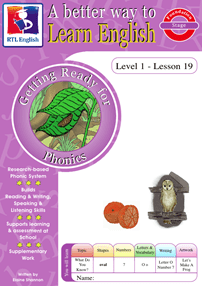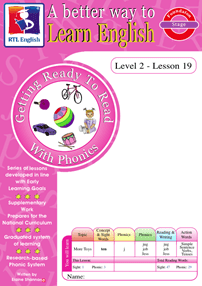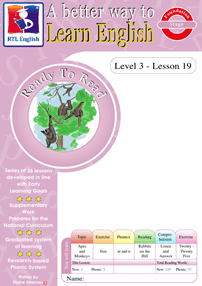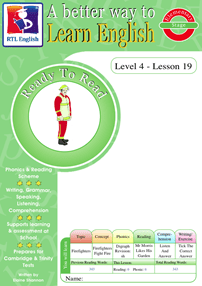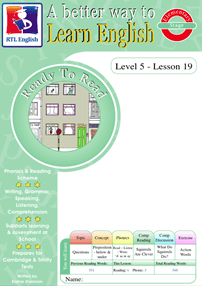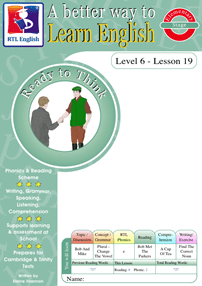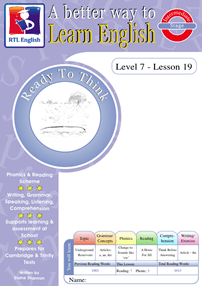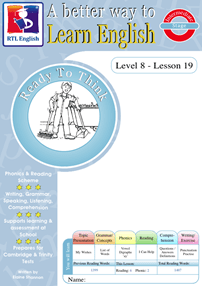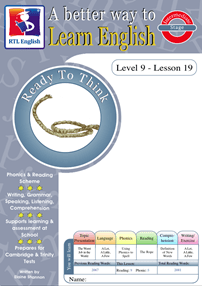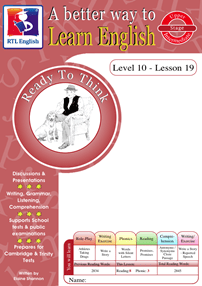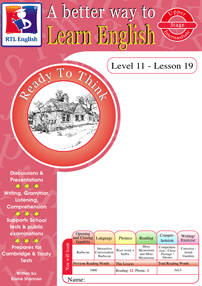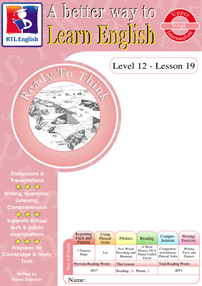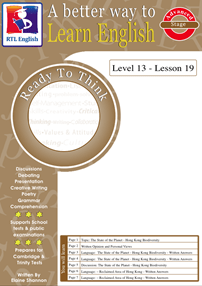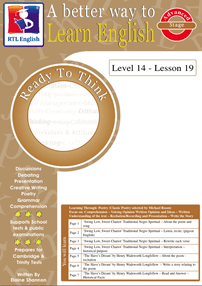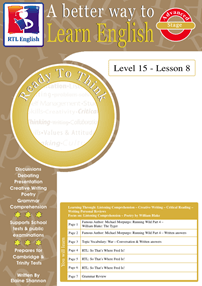English lessons for kids in Leon, Florida

For nearly 30 years, RTL English has been taught in schools, tutorial centres & at home both as part of the curriculum and as a supplementary activity. RTL English is growing in popularity worldwide, so why not join hundred of thousands of parents, tutors & teachers around the world & teach your child RTL English today?
Teaching your son or daughter to use English confidently might very well be the key to their success at school in Florida, at exams, in his or her career & beyond.
Teaching English to your son or daughter might be the key, not only to his or her success in school in Leon, but also their sense of self-worth, both in Florida and beyond.
Elaine Shannon, Author & Curriculum Designer Tweet
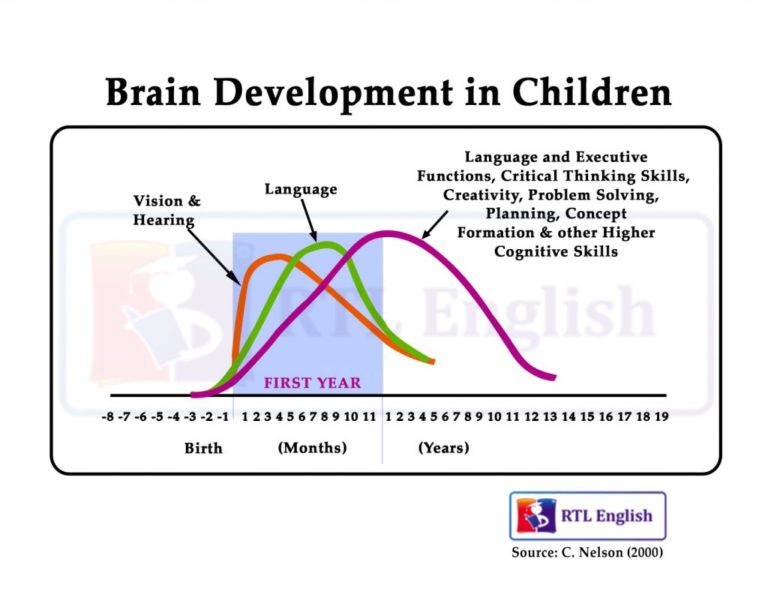
- Early & advanced English skills will make your son or daughter smarter.
- Early & advanced English skills will improve problem solving.
- Early & advanced English skills will improve planning, & abstract thinking skills.
- Early & advanced English skills will help develop complex idea comprehension.
- Early reading can help children compensate for modest levels of ability in other areas. (*Ref)
ON A PRACTICAL LEVEL, HOW IMPORTANT IS EARLY READING?
- Your child’s reading ability and vocabulary at 3 years old might predict his or her success in school in Leon when they are 6 to 7 years old (*Ref).
- Your child’s reading ability at 6 to 7 years old might predict their success at 17 to 18 years old (*Ref)!
- Your child’s reading ability at 7 to 8 years old might determine their graduation from senior school in Leon (*Ref).
ON THE OTHER HAND:
- Children who can’t read proficiently by 7 to 8 years old are four times more likely to leave school without a diploma/results than proficient readers (*Ref).
and:
- Children who are not taught Phonemic Awareness, and therefore have to rely on memory have difficulty beginning to read & continue to have difficulty with new words.
BUT, SURELY SCHOOL WILL TEACH MY CHILD TO READ? SO, WHY DO I NEED TO BOTHER?
If this is what you are thinking, then you should know that you cannot rely on schools, including those in Leon …
- In the USA, almost 70% of children at school who are aged 9-10 years old cannot read proficiently (*Ref)!
- And, of those children, 33% of them read at only a very basic level, and 34% are reading at a very limited level (*Ref).
- It’s not so different in the UK, where over 100,000 children leave school illiterate(*Ref).
- Or in Australia, where 33% of students aged 11 years old fail to meet literacy benchmarks (*Ref).
- Or in Canada, where 42% of the entire adult population is only semi-illiterate (*Ref).
NO, YOU CANNOT RELY ON SCHOOLS.
But, why not?
- Teachers don’t always understand the basic building blocks of language and reading
- Teachers frequently don’t know how to teach English language concepts
- There just aren’t enough qualified teachers
- Classes are too large
- Kids don’t get enough attention from teachers in the classroom
- Schools aren’t using the correct teaching systems – i.e they rely on rote learning or sight words
- Schools are overwhelmed & have tried to shift some of the burden of teaching onto apps and computers
UNFORTUNATELY, IT IS A FACT THAT:
Being illiterate is a guaranteed ticket to a dead end.
YOU NEED TO TAKE CHARGE OF YOUR CHILD’S EDUCATION – TODAY!
BUT HOW?
You can begin by teaching English to your child.
By Teaching your child to read your son or daughter will develop early reading skills that will help put them years ahead of other children in Florida. So, if you’ve decided that you want to become a proud parent of a happy & smart child, then you owe it to your son or daughter to teach them to read and improve their English.
WE HELP PARENTS TEACH ENGLISH TO CHILDREN
RTL English™ offers 600 easy-to-teach & downloadable English lessons for parents to teach to their child at home. Our workbooks will help your son or daughter to catch up, keep up & stay ahead! Our lessons also challenge more advanced students; so whatever your child’s ability, there’s sure to be an RTL English workbook lesson that’s suitable for them.
THE RTL ENGLISH CURRICULUM CONSISTS OF 15 YEARS (LEVELS) OF TEACHING MATERIALS WHICH INCLUDE 600 LESSON WORKBOOKS COMPRISING FOUR THOUSAND WORKSHEETS AND NINETEEN THOUSAND TEACHING INSTRUCTIONS AND WILL SAVE YOU OVER TWO THOUSAND DAYS OF LESSON PREPARATION TIME!
Foundation Stage
Includes Level 1, 2 & 3.
Suitable for kids aged 3-6 years old in Leon, Florida
Elementary Stage
Includes Level 4, 5 & 6.
Suitable for kids aged 6-9 years old in Leon, Florida
Intermediate Stage
Includes Level 7, 8 & 9.
Suitable for kids aged 9-12 years old in Leon, Florida
Upper Intermediate Stage
Includes Level 10, 11 & 12.
Suitable for kids aged 12-15 years old in Leon, Florida
Advanced Stage
Incl. Level 10, 11 & 12.
Suitable for kids aged 15-18 years old in Leon, Florida
Winning Awards Since 1996
With 24 years of research, development, dedication and experience, RTL English is committed to offering the best possible start to English language learners worldwide. RTL English is part of the Ready To Learn group, an international educational organisation with students worldwide.
Elaine Shannon founded Ready To Learn in 1996, and is an internationally respected author, language expert and School Principal with more than 40 years of specialist experience. Elaine & her team of instructional designers, linguists and educational experts developed the RTL English Curriculum.
What Happens In A Lesson?
- Each lesson is designed to last approximately 60 minutes. Normally, your child will spend 55 minutes participating in learning activities, and 5 minutes completing an achievement exercise that’s used to reinforce the lessons’ learning designs & objectives.
- Each lesson is accompanied by an RTL English lesson workbook. The workbook consists of six worksheets of instructional content and one reinforcement exercise page.
- You will use the workbook & teaching notes to guide and lead your child through the variety of learning activities in the workbook.
- Although all of our workbooks follow a similar format, each one is slightly more challenging than the last in the sequence. As a result, your child will be able to advance in small manageable steps & acquire English language skills that will last them a lifetime.
- There are 5 learning stages, 15 learning levels and 600 lessons in the RTL English curriculum.
- Your child will need to complete 36 lessons to finish one learning level – which lasts approximately 1 academic year.
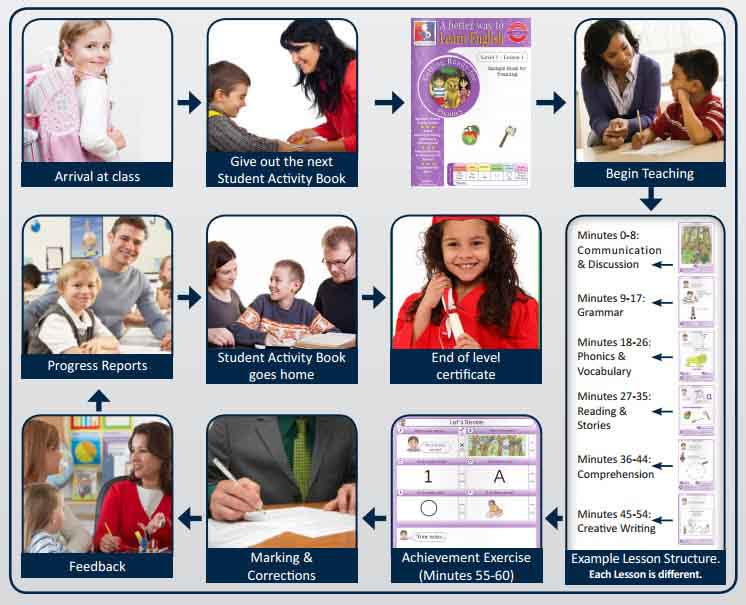
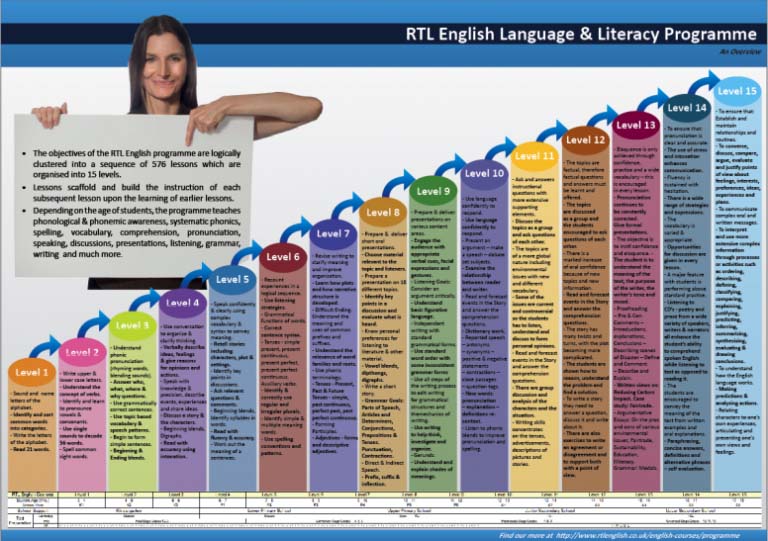
What Will My Child Be Taught?
It depends on your child’s age and their English language ability. To find out what your child will be taught, please click the grey button & then click the book cover that’s closest to your child’s current age → Lesson Workbooks
The RTL English Curriculum teaches all the communicative functions and language forms your child will need to succeed in school, exams and beyond, including:
- Phonemic Awareness
- Alphabetic Principle
- Systematic & Explicit Phonics
- Fluency with Text
- Proficient Grammar Knowledge
- Creative Writing
- Expanded Vocabulary
- Advanced Comprehension, and
- Confident Speaking Skills
The RTL English Curriculum: Kids 3 to 18 Years Old
Whatever your son or daughter’s age or English language ability, there is sure to be an RTL English course (aka ‘level’) that will help your son or daughter learn or improve their English. This is because our curriculum provides 15 years of learning for child aged 3 to 18 years old & teaches all the communicative functions and language forms your son or daughter will need to have a richer, more successful educational experience. RTL English will also supplement your child’s learning at his or her school in Leon.
The RTL English Curriculum consists of 15 years (levels) of teaching materials which include 600 workbooks (comprising 4,000 worksheets & 19,000 teaching notes) and saves over 2,000 days of preparation time.Level 1
Kids: 3-4 years old
36 lessons. 36 workbooks. 252 worksheets. 1134 teaching instructions.
Level 2
Kids: 4-5 years old
36 lessons. 36 workbooks. 252 worksheets. 1134 teaching instructions.
Level 3
Kids: 5-6 years old
36 lessons. 36 workbooks. 252 worksheets. 1134 teaching instructions.
Level 4
Kids: 6-7 years old
36 lessons. 36 workbooks. 252 worksheets. 1134 teaching instructions.
Level 5
Kids: 7-8 years old
36 lessons. 36 workbooks. 252 worksheets. 1134 teaching instructions.
Level 6
Kids: 8 -9 years old
36 lessons. 36 workbooks. 252 worksheets. 1134 teaching instructions.
Level 7
Kids: 9-10 years old
36 lessons. 36 workbooks. 252 worksheets. 1134 teaching instructions.
Level 8
Kids: 10-11 years old
36 lessons. 36 workbooks. 252 worksheets. 1134 teaching instructions.
Level 9
Kids: 11-12 years old
36 lessons. 36 workbooks. 252 worksheets. 1134 teaching instructions.
Level 10
Teens: 12-13 years old
36 lessons. 36 workbooks. 252 worksheets. 1134 teaching instructions.
Level 11
Teens: 13-14 years old
36 lessons. 36 workbooks. 252 worksheets. 1134 teaching instructions.
Level 12
Teens: 14-15 years old
36 lessons. 36 workbooks. 252 worksheets. 1134 teaching instructions.
Level 13
Teens: 15-16 years old
36 lessons. 36 workbooks. 252 worksheets. 1134 teaching instructions.
Level 14
Teens: 16-17 years old
36 lessons. 36 workbooks. 252 worksheets. 1134 teaching instructions.
Level 15
Teens: 17-18 years old
8 lessons. 8 workbooks. 56 worksheets. 252 teaching instructions.
Can I See A Lesson Workbook?
There are 600 workbooks like the one below. Lesson 19, Level 1 below suits children between 3 and 4 years old. To see an example of a lesson workbook that is likely to suit your child, please click the grey button & then click the book cover that’s closest to your child’s current age → Lesson Workbooks
What Method Do You Use?
- We teach using a Step-by-Step method. The content of each lesson is determined by an 8-page workbook that’s slightly more challenging than the last in the sequence. Lessons ‘scaffold’ and build upon the learning of the previous lesson. As a result, students advance in small, manageable steps and acquire English language skills that enable them to achieve better results in school, exams & beyond..
- Sequenced instruction is organised into 5 developmentally appropriate stages, 15 levels of increasing difficulty and 600 lessons. Each lesson provides one hour of learning per week and follows a workbook that consists of six worksheets with instructional content and one reinforcement exercise page.:
- Each lesson is accompanied by a workbook follows a similar plan:
- Page 1 :: Communication/ Discussion/ Topic orientated
- Page 2 :: Grammar/ Language
- Page 3 :: Phonics/ Vocabulary
- Page 4 :: Reading (Ongoing Story)
- Page 5 :: Story Comprehension/ Language
- Page 6 :: Grammar/ Language Exercise
- Page 7 :: Achievement Exercise / Assessment
- Depending on your child’s age and their English skills, instruction will typically consist of a variety of activities including speaking, listening, letter-sound correspondence, sight words, guided oral reading, text comprehension, creative writing, grammar and critical thinking.
- You don’t need to prepare anything or create teaching materials for an RTL English lesson. It’s all been done for you. Each page of this workbook contains teaching notes to enable you to guide and lead your child through the learning activities. Once your son or daughter has finished their lesson, record their achievements in the progress report form and then simply print the next workbook in the sequence.
Will My Child Learn Phonics?
- Yes! We teach synthetic & analytical phonics which includes 44 basic phonemes, 22 beginning blends and 15 ending blends.Our students learn and practise phonics throughout our Foundation, Elementary, Intermediate and Upper Intermediate stages. Our Advanced stage uses phonics to teach pronunciation.
- We pay particular attention to blended consonant sounds (that are located at the beginning and end of many words). We teach vowels first and then consonants. As soon as possible we teach children to read. In practice this means after students have learnt 5 vowel sounds and 2 consonants they can read a few words by themselves. Children are also taught how to decode words, so from the very beginning they can see new simple words and know how to read them.
Coordinates: 28°06′N 81°36′W / 28.1°N 81.6°W / 28.1; -81.6
Florida (, Spanish pronunciation: [floˈɾiða]) is a divulge located in the southeastern region of the United States. With a population of beyond 21 million, Florida is the third-most populous and the 22nd-most extensive of the 50 United States. The permit is bordered to the west by the Gulf of Mexico, to the northwest by Alabama, to the north by Georgia, to the east by the Atlantic Ocean, and to the south by the Straits of Florida. The state's capital is Tallahassee and its most populous municipality is Jacksonville. The Miami metropolitan area, with a population of with suggestion to 6.2 million, is the most populous urban area in Florida and the seventh-most populous in the United States. Other urban areas in the welcome with a population of over one million are Tampa Bay, Orlando, and Jacksonville. Florida's $1.0 trillion economy is the fourth-largest of any U.S. state, and if it were a country, Florida would be the 16th-largest economy in the world.
The first European door was made in 1513 by Spanish entrepreneur Juan Ponce de León, who called it la Florida ([la floˈɾiða] "the estate of flowers") upon landing there. At various points in its colonial history, Florida was administered by Spain and Great Britain. Florida was admitted as the 27th state on March 3, 1845. Florida was the principal location of the Seminole Wars (1816 – 1858), the longest and most extensive of Indian Wars in United States history. Florida acknowledged its secession from the Union on January 10, 1861, and was one of the seven native Confederate States. After the Civil War, Florida was restored to the Union upon June 25, 1868.
Today, Florida is distinctive for its large Cuban expatriate community and tall population growth, as capably as for its increasing environmental issues. The state's economy relies mainly upon tourism, agriculture, and transportation, which developed in the late 19th century. Florida is also Famous for amusement parks, orange crops, winter vegetables, the Kennedy Space Center, and as a popular destination for retirees. It is the flattest come clean in the United States, and Lake Okeechobee is its largest freshwater lake.
The state's near proximity to the ocean influences many aspects of Florida culture and daily life. Florida is a extra of influences and merged inheritance; African, European, indigenous, Latino, and Asian heritages can be found in the architecture and cuisine. Florida has attracted many writers such as Marjorie Kinnan Rawlings, Ernest Hemingway and Tennessee Williams, and continues to attract celebrities and athletes. It is internationally known for golf, tennis, auto racing, and water sports. Several beaches in Florida have turquoise and emerald-colored coastal waters.
About two-thirds of Florida occupies a peninsula in the midst of the Gulf of Mexico and the Atlantic Ocean. Florida has the longest coastline in the contiguous United States, approximately 1,350 miles (2,170 km), not including the contribution of the many barrier islands. Florida has a sum of 4,510 islands that are ten acres (4 ha) or larger in area. This is the second-highest number of islands of any state; only Alaska has more. It is the only come clean that borders both the Gulf of Mexico and the Atlantic Ocean. Much of the state is at or near sea level, and is characterized by sedimentary soil. Florida has the lowest tall point of any U.S. state. The American alligator, American crocodile, American flamingo, Roseate spoonbill, Florida panther, bottlenose dolphin, and manatee can be found in Everglades National Park in the southern part of the state. The climate varies from subtropical in the north to tropical in the south. Along in imitation of Hawaii, Florida is one of and no-one else two states that have a tropical climate, and is the abandoned continental declare that has both a tropical climate and a coral reef. The Florida Reef is the only lively coral barrier reef in the continental United States, and the third-largest coral barrier reef system in the world (after the Great Barrier Reef and Belize Barrier Reef).
Academic References
- The Cognitive Foundations of Learning to Read: A FrameWork Sebastian Wren
- The relatonship of phonemic awareness to reading acquisiton: more consequence than preconditon but still important. Wimmer H, Landerl K, Linortner R, Hummer P. University of Salzburg, Austria.
- NAEP 1998 Reading Report Card for the Nation and the States March 1999 Authors: Patricia L. Donahue, Kris n E. Voelkl, Jay R. Campbell, and John Mazzeo
- National Institute of Child Health and Human Development. (2000). Report of the National Reading Panel. Teaching children to read: An evidence-based assessment of the scientific research literature on reading and its implications for reading instruction (NIH Publica on No. 00-4769). Washington, DC: U.S. Government Prin ng Office.
- Wikipedia: http://en.wikipedia.org/wiki/Functional_illiteracy
- J Learn Disabil. 2009 Sep-Oct;42(5):392-402. Epub 2009 Jun 19. Why elementary teachers might be inadequately prepared to teach reading. Joshi RM, Binks E, Hougen M, Dahlgren ME, Ocker-Dean E, Smith DL.
- Australia Government Department of Educa on, Science and Training: htt p://www.dest.gov.au/archive/schools/literacy&numeracy/charts.html
- CBC News: Canada’s Shame – h p://www.cbc.ca/news/background/educa on/canada-shame.html
- The Timing and Quality of Early Experiences Combine to Shape Brain Architecture Center on the Developing Child, Harvard University
- Vocabulary Development and Instruc on: A Prerequisite for School Learning Andrew Biemiller, University of Toronto iii. Early reading acquisiton and its relation to reading experience and ability 10 years later. Cunningham AE, Stanovich KE.
- Double Jeopardy How Third-Grade Reading Skills and Poverty Influence High School Gradua on Donald J. Hernandez, Hunter College and the Graduate Center
- What Reading Does for the Mind ANNE E. CUNNINGHAM and KEITH E. STANOVICH

